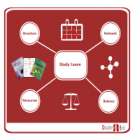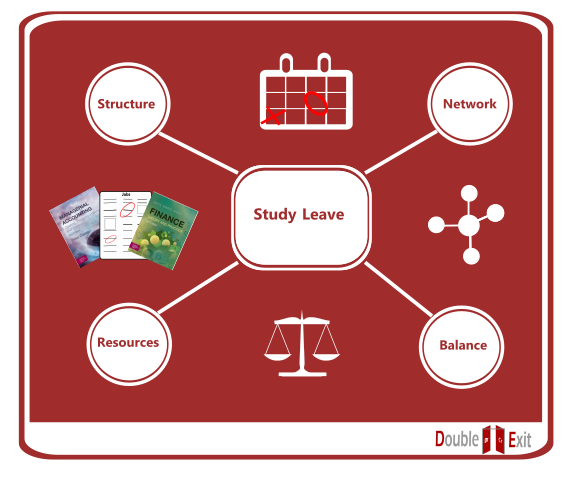Getting the Most Out of Study Leave

It is that time of year again when the continuous assessment season draws to a finish and the focus begins to turn to study leave. While the length of study leave will vary for students depending on the level they are at (CAP1, CAP2 or FAE), the firm/company they work for, and the timetable they are taking (evening/weekend, distance, or block release), some key principles are common to getting the most out of your study leave.
Below I take a look at some of these key principles that will help you have a productive and enjoyable (ok, perhaps a stretch!) study leave and leave you in a good position come exam week.
Structure
The freedom of study leave can be a bit much for many students early on resulting in a holiday mentality for the first part of study leave. It is very important that students take a structured approach to study leave – some like to treat is a normal 9-5 Monday-Friday structure similar to work, while others prefer to have a structure of 3-4 hour morning and evening study sessions and free time during the day. The key is to have a structure that works for you and to put a daily/weekly plan in place in terms of what areas you will be studying and monitor that progress.
Key Tips
- Do up an overall study leave plan including weekly targets of where you need to be – work back from exam week to week 1 of study leave.
- Create lists of “study chunks” (30-40 mins of work) for each subject and tick them off as you cover them.
- Use this list to plan your day/week ahead – e.g. “I’ll do these four chunks of FR & four chunks of audit tomorrow”.
- Figure out what times suit you best to study (early morning, night time) and what environment (background music, home vs library) and make your schedule fit this.
Network
Study leave can be a time of isolation for many, particularly if you go home from Dublin for the period. It is important that you keep a good network of contacts to perhaps form a study group, discuss issues with, share notes, and just to complain in general! Having a small group of like-minded individuals either from your lectures, your work, or past classmates in college can be a great resource over study leave and will remind you that you are not the only one making the journey through these exams!
Key Tips
- Form a small group of like-minded contacts (not the braggers or panickers!) doing the same exams and keep in regular contact (e.g. phone, weekly coffee, whatsapp group etc.) to discuss progress, tricky areas, useful resources etc.
- Keep an eye on forums such as boards.ie where there can be regular discussions on the exams in the weeks leading up to it (be careful re the accuracy of some posts on these sites!).
- Make use of your work colleagues or friends who have gone through the exams already in terms of their advice re study, notes, exam technique etc. You are not the first, nor will you be the last to sit these exams!

Resources
While it may sound very basic, it is important that you have all the key resources (textbooks, notes, question packs, past papers, examiner reports) sorted before you go on study leave. Many students leave note printing and putting things in folders until the start of study which really should be when you are refining your notes and planning what you need to do over the next few weeks.
Key Tips
- Try to put a plan in place to have all the key resources (notes, exam papers, folders) ready before you go on study leave.
- Do out a list of all lectures taken place to date and identify key ones that you have missed (there are always a few!) that you need to catch up on – make a plan to get these complete before study leave.
- Ask your work colleagues and/or friends who have gone through the exams already (esp. for CAP2 & FAE) about the structure for their folders.
Balance
Study leave can be an overwhelming time for some and with many students getting a significant period of time off for study (e.g. 8-12 weeks for CAP2/FAE for some firms), this can lead to burn out well before they even get to exam week. The most successful students take a balanced approach to study leave and have a number of outlets outside of their studies to break up the study routine and give their mind a rest. These outlets can be very varied from farming to running to GAA but the key principle is that it provides a break from the intense nature of study leave for students.
Key Tips
- Take a balanced approach to study leave and do not over-do it early on in study leave. It can be a long period and you need to ensure you do not burn out in advance of exam week.
- Identify some hobbies/outlets to break up study days and take your mind away from the books completely. Build this time into your overall study plan structure.
- Get into a routine and look after yourself – many students will go back home for student leave (aka free Bed & Board!) but for others not having that privilege it will be important to eat and sleep well, particularly in the run up to exam week where your energy resources will need to be high.
Ultimately study leave is about preparing yourself to pass your exams. Letting a week or two slip by due to a holiday mentality when you initially get on study leave and then cramming for the rest of the period to catch up is an all too common occurrence for many students. Taking a structured and balanced approach from the outset can seem like the boring thing to do (we are accountants after all!) but it will pay off in spades when you arrive at exam week ready for back to back exams.
Happy studying and keep an eye out for more posts on dealing with exam week in the next few weeks!


no comments